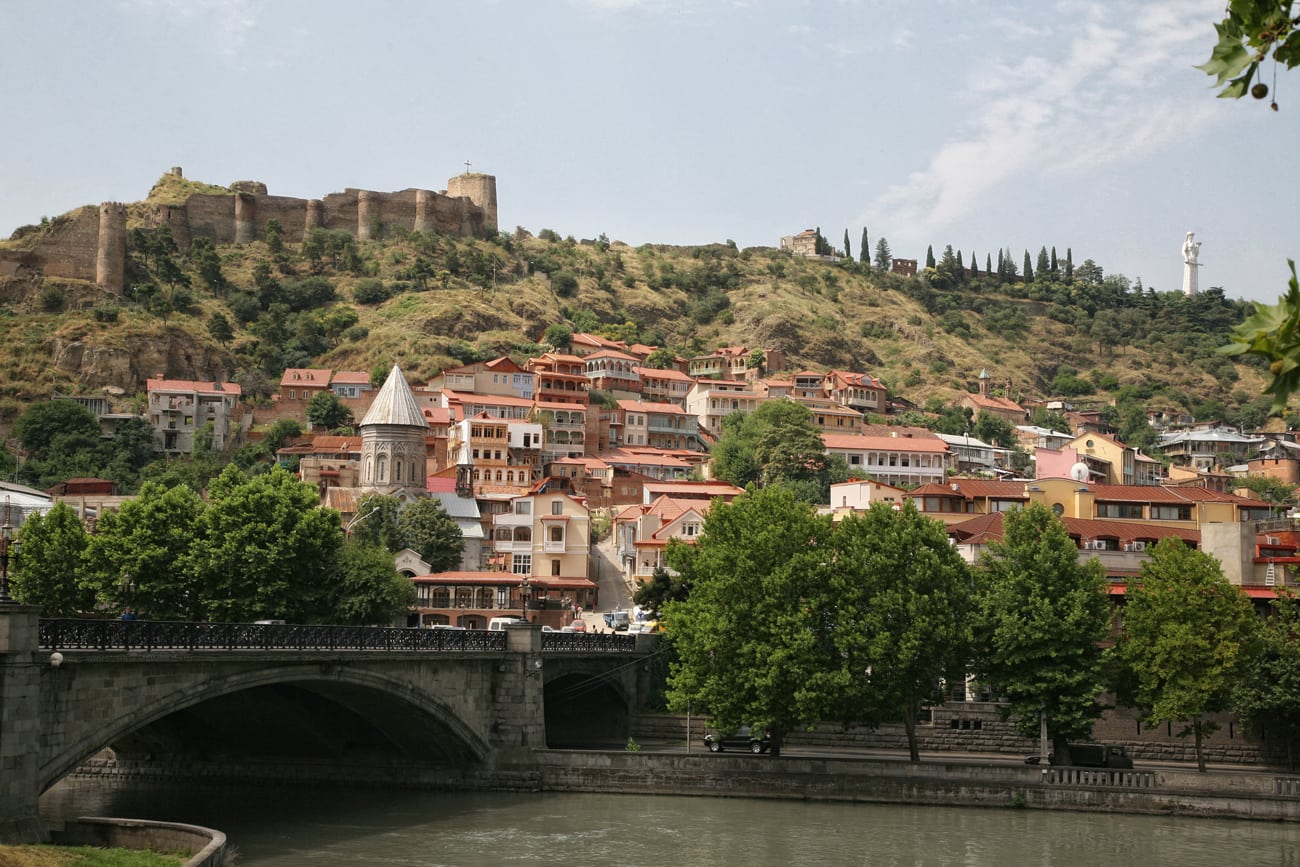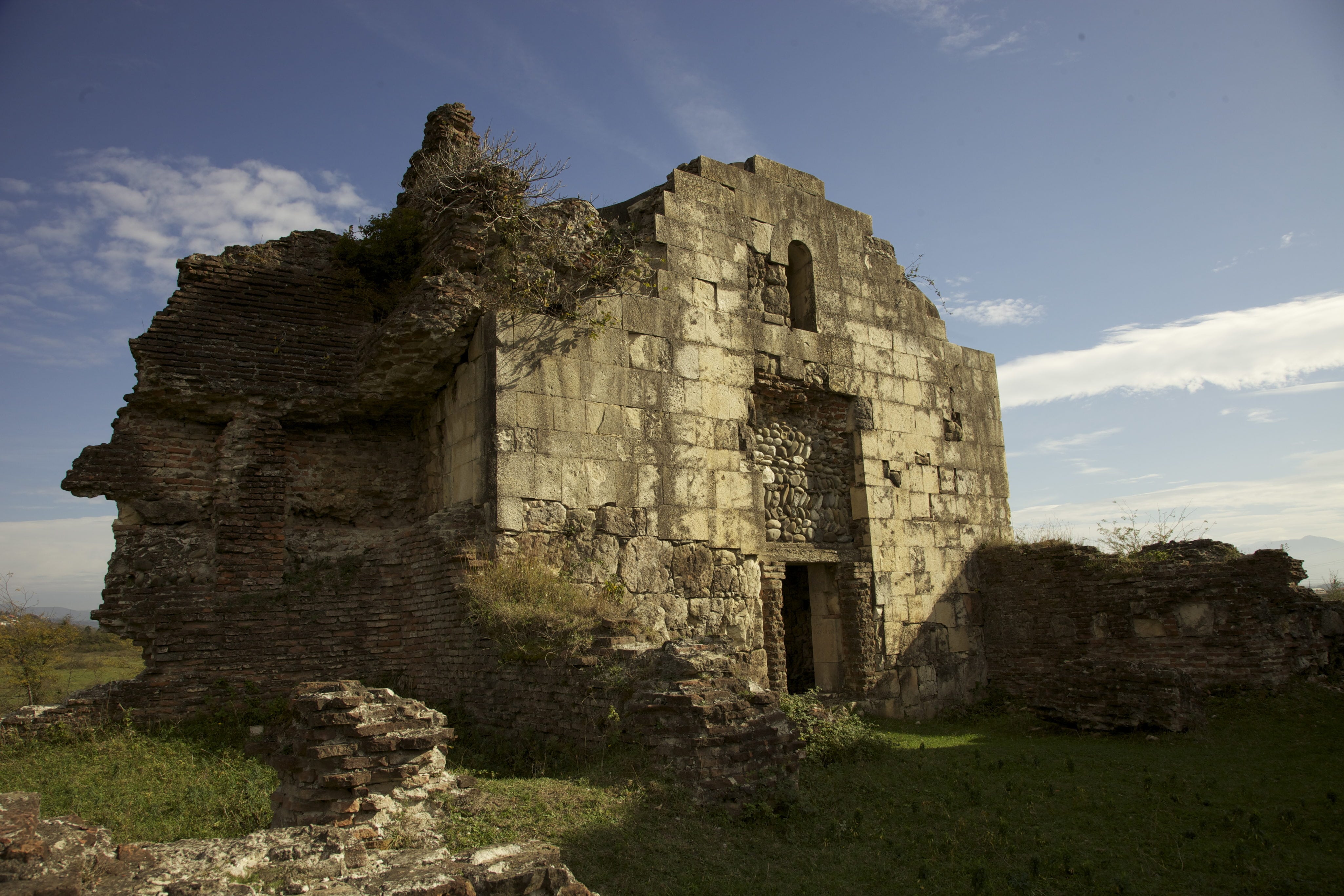Why Tbilisi, Georgia Is One of the Most Unique Places You Will Ever Visit
On my second night in Tbilisi, after an opulent yet relatively inexpensive meal consisting of salty triangles of cheese-filled bread (khachapuri) and a jeroboam of wine at the Old City Wall restaurant, I am walking back to my hotel with some fellow travel companions when a car full of menacing-looking eastern European bros slowly drives past us. I brace myself for a flurry of expletives, but instead we are greeted with a rambunctious holler: “WELCOME TO GEORGIA!” The unexpected salutation is the first of many surprises I encounter in this tiny country bordering Russia, Turkey, Armenia and Azerbaijan.
Georgia is a study in opposites. A short walk through downtown Tbilisi reveals crumbling 19th-century European facades juxtaposed with Soviet brutalist architecture. On the hillside overlooking the city of more than one million, there’s an enormous glass villa built by a Georgian banking magnate. This $65 million home hovers like a suspended UFO above the humble clay-tiled roofs below it.
The country is technically only a mere 27 years old—its most recent declaration of independence was from the collapsing Soviet Union in 1991—yet it contains the vestiges of monasteries that date back to the 12th century. Men with guns patrolled the streets of Tbilisi during the early ’90s, but when you land at the airport today, you’re greeted with signage that reads “The city that loves you.”

Georgia didn’t embrace a Western-style democracy until the peaceful Rose Revolution in 2003, yet our tour guide claims that one of the country’s most significant economic drivers is mining cryptocurrency. If this all sounds somewhat confusing and possibly overwhelming, you’re not wrong, but the confluence of such unlikely factors swirling together makes Georgia one of the most profoundly bewitching and enigmatic places I’ve ever visited.
My mood today is in stark contrast to how I felt a day earlier, when I landed in the city after a rather brutal 12-hour layover in Munich. (I can now deeply relate to Tom Hanks’s character in The Terminal.) The frazzled fatigue lifted as soon as I arrived at the plush Rooms Hotel Tbilisi. The Wes Anderson-esque bellhops and bohemian vibe charmed me, and my first meal—a three-hour affair at Shavi Lomi (“Black Lion”)—ended with shots of throat-searing chacha, a grape hard liquor that’s a Georgian party staple. The other highlight was the pungent salad of fresh scallions and springy morels, which had been foraged by Goran, an aging nomad who came by our table to share the wisdom he has gleaned since dropping out of society to live among camels.
I can only imagine who I will meet today. There’s an overarching feeling of anticipation in the air, as if Georgia is teetering on the precipice of becoming the next Lisbon or Buenos Aires. Its tourism revenue has doubled in the past five years, no doubt thanks in part to talented Georgian fashion designers like Demna Gvasalia and David Koma dominating the world stage. Yet the most compelling reason to visit Georgia is the country’s complete lack of artifice.

Nowhere is this more evident than at the Deserter’s Bazaar, a food market in central Tbilisi where locals sell bundles of tarragon, desiccated-looking pomegranates and wet wheels of imeruli cheese from ramshackle stalls made of plastic tarps and dilapidated patio umbrellas. One vendor insists I try her homemade sauces, bottled in recycled plastic Coca-Cola bottles, and then proceeds to distribute them via mouldy hunks of bread. (I discreetly attempt to avoid the mould by licking the sauces off the bread.) I buy a couple of strands of churchkhela (a candle-shaped Georgian treat made of nuts on a string and dipped in thickened grape juice) to take home. Within walking distance is the Dry Bridge Flea Market, where vendors hawk jewellery, Soviet tchotchkes and kitchen implements from blankets on the ground.
Even the wines in Georgia are marketed as natural. Natural wine may be only beginning to gain traction in North America, but Georgians have been producing it since 6000 BC. (No, this isn’t a typo. Archeologists unearthing two villages near Tbilisi found evidence that these early residents produced wines, making them some of the world’s first-known vintners.) Natural wine operates on a philosophy of nothing being added or taken away, and much of it is cloudy with sediment and tastes like tart apple juice (but with no nostril-flaring acridity).
“Georgia is famous for its opulent hospitality,” says John Wurdeman, the owner of Pheasant’s Tears winery, where we sampled a wine called Poliphonia, made from a blend of multiple endemic Georgian grape varieties, that one of my travel companions called “spiritual.” Later, at Wurdeman’s restaurant, also named Poliphonia, we sit at a communal table that groans under the weight of such dishes as pickled wildflowers (jonjoli) and mozzarella dumplings with yogourt-mint sauce. The meal is punctuated with prolific toasting—a Georgian tradition that dictates that whenever a guest experiences a raw emotion, they must propose a toast. The result is a meal engagingly interrupted with emphatic displays of warmth and affection. Poliphonia’s co-owner, Luarsab Togonidze, joins us, along with a number of cronies who spontaneously break out into Georgian folk songs. The a cappella harmonizing adds yet another layer of wistful emotion to the scene. Togonidze explains that the Georgian way is to approach life with a sense of openness and vulnerability. “All my life, I’ve been trying to attach a handle to my chest so you can open it up and see my heart,” he says.
From that evening on, the locals’ earnest, wholehearted and cynicism-free outlook on life seduces me. During my nine-day stay, I slowly learned how to drop my ingrained sense of North American pessimism and just be. “You’ve been given a chunk of our heart, and you can keep that with you, for better or worse,” says Wurdeman. For me, it is definitely for the better. That woman who once feared a car full of local well-wishers went home with a little piece of Georgia in her heart.
The post Why Tbilisi, Georgia Is One of the Most Unique Places You Will Ever Visit appeared first on FASHION Magazine.